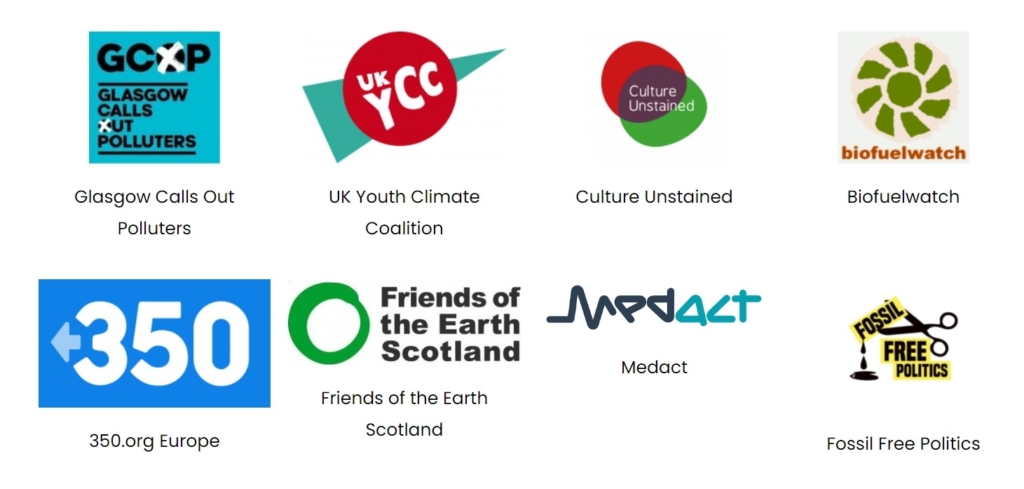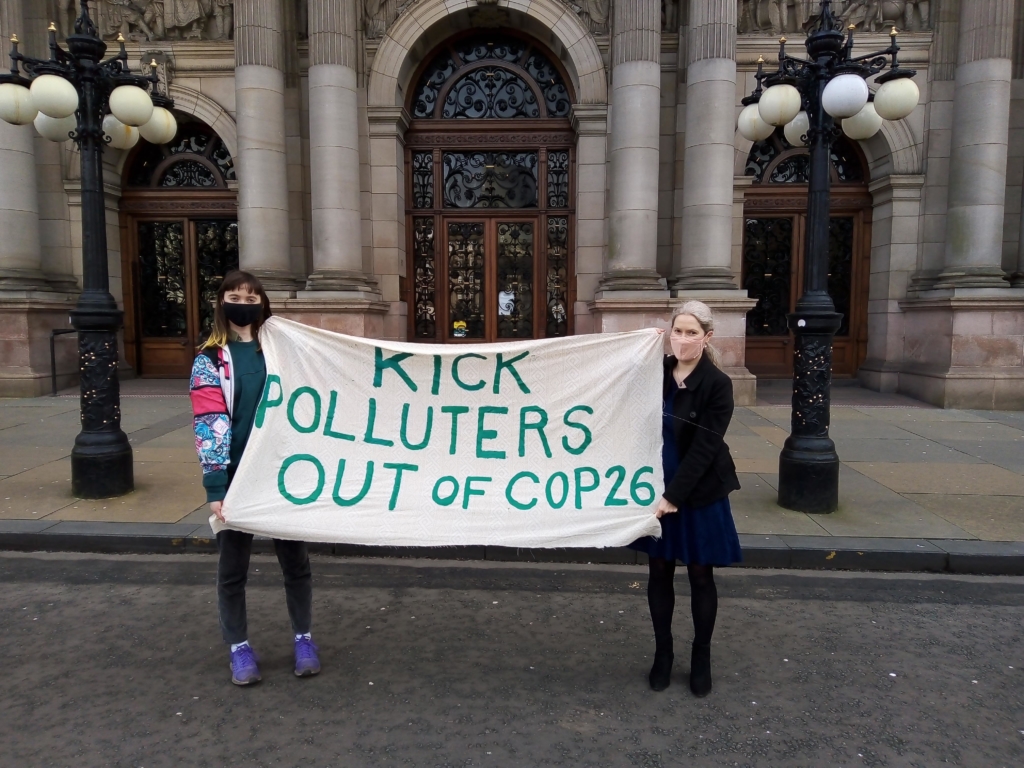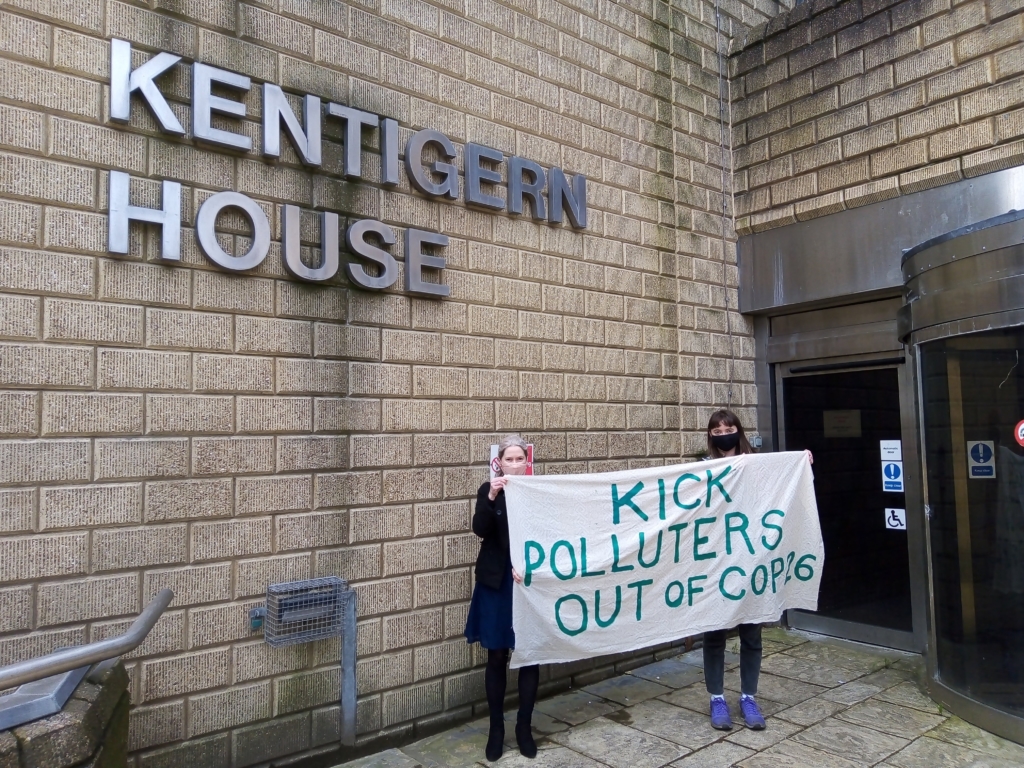A Message to Alok Sharma from Glasgow and Beyond: Keep Polluters out of COP26


Yesterday the UK govt shocked environmental groups after the publication of the government and industry-backed North Sea Transition Deal, revealed the refusal to rule out the possibility of a new wave of oil and gas exploration licenses and the complete failure to set a target for ending fossil fuel extraction from UK waters amounting to “a colossal failure in climate leadership in the year of COP26”.
The battle to make this year – and this process towards COP26 in Glasgow meaningful – is well underway. Today, over 170 grassroots groups from Glasgow and across the globe are demanding that the UK government force a change in the normal proceedings of the UN climate negotiations by removing big polluters’ access to the talks.
The groups include Glasgow Calls Out Polluters, Culture Unstained. Friends of the Earth Scotland, Divest Strathclyde, BP or not BP Scotland, Fridays for Future Scotland, Extinction Rebellion Glasgow, Transition Edinburgh, Teach the Future Scotland, Organic Growers of Fairlie, Jubilee Scotland, Scot.E3 (Employment, Energy and Environment), Women of Colour – Scotland, Ecoartscotland, Friends of the Earth Falkirk, Scottish Communities Climate Action Network (SCCAN), 350.org Europe and many many more.
Ahead of the UK’s role as hosts of the COP26 United Nations climate change summit in Glasgow in November 2021, an open letter initiated by the campaign group Glasgow Calls Out Polluters has been sent to UK Government Minister and COP26 President, Alok Sharma. The letter, signed by over 170 groups from across the world, lays out five steps the UK Government can take to kick out big corporations who are most responsible for the climate crisis.
The letter demands that these polluting groups are denied access to both COP26 and all UN climate talks going forward under what is known as a Conflict of Interest Policy*. There is precedent for removing parties whose financial interests have a malign effect on global negotiations, with big tobacco companies excluded from World Health Organisation talks. The letter also calls on the UK Government to refuse sponsorship from polluting groups, and they urge the event hosts to reject so-called false solutions that are favoured by corporate actors.
Our predicament remains perilous:
The IPCC Special Report on 1.5°C assessed 9 scenarios that kept .° (all others go over 1.5°C before returning).
In these scenarios, CO₂ emissions decline 70% by 2030, global coal use declines >80%…
Does anyone really think we can avoid crossing 1.5°C? pic.twitter.com/9HoFA8OjZx
— Glen Peters (@Peters_Glen) March 21, 2021
The presence of large fossil fuel based corporations has been a feature of previous UN climate negotiations and there have been demonstrations from civil society on this issue. There has also been criticism of the slow progress of the talks themselves, throwing their ability to deliver climate action into question.


Isla Scott, a representative of Glasgow Calls Out Polluters, said that:
“The UN Climate Talks have for too long protected business as usual at the expense of meaningful action and now people across the world are living with the consequences. This letter sends a clear message that big polluters – whose profits are dependent on inaction – have no place influencing the talks. The UK Government, if they take the climate crisis seriously, should stand up to these vested interests and remove them from the talks.”
Following the Coronavirus pandemic, COP26 was delayed from November 2020 to November 2021. The UK Government has sought to position themselves as being at the forefront of climate ambition. However, in recent months they have legislated for a controversial cut on domestic air passenger duty, accepted a proposed coal mine in Cumbria (before putting the decision under review following widespread criticism) and delayed action on the UK Environment Bill.
Signatory to the letter, Eilidh Robb of UK Youth Climate Coalition added that:
“Although we’ve all become pretty accustomed to delayed events recently, that is no excuse for the UK government to remain asleep at the wheel on climate action. To speed things up we need to stop the preferential treatment of large polluters, by clearing the space to make room for people-centered solutions to climate change.”


There are still 220 days until COP26 and the preparatory intersessional sessions are yet to take place. This, campaigners believe, gives the UK Government ample time to push a conflict of interest policy.


Can you please in future posts state that it’s the Westminster government instead of the U.K. government as that infers that the whole of the U.K ( so called) have agreed in principle as a group, when we all know that’s not the case.
Thanks, will do. Is that really the only point you have having read the article?
[Disclaimer: PG – Paternal Guidance Suggested. The following might not be suitable for reading. This heteronymous post questions the assumptions that inform the above article and/or the comments that have been made by some of its other commentators; its poster has nothing substantive to say for her/himself. Readers are urged to seek paternal guidance as to its suitability for reading from one of the site’s self-appointed arbiters.]
That’s just nonsense, Murry.
The UK government (‘Whitehall’) is dependent for its power to the UK parliament (‘Westminster’), which expresses – albeit imperfectly – the collective will of the people over whom the former has jurisdiction.
You might not like the fact that you’re a constituent of that collectivity, but the fact remains that, ultimately, what’s agreed by the UK government is an (albeit imperfect) expression of the collective will of everyone who lives on these islands.
That you may or may not agree with this expression, which is your right as a private individual, doesn’t change this fact.
I’ve been looking for an explanation of the asterisk beside ‘Conflict of Interest Policy’?
Clearly progress is far too slow, and prospects not much better, but all the parties that are part of the problem have to be part of the solution. I’d say make sure they’re there, treat with scepticism, and make sure that they learn they might not survive to be at the next one.